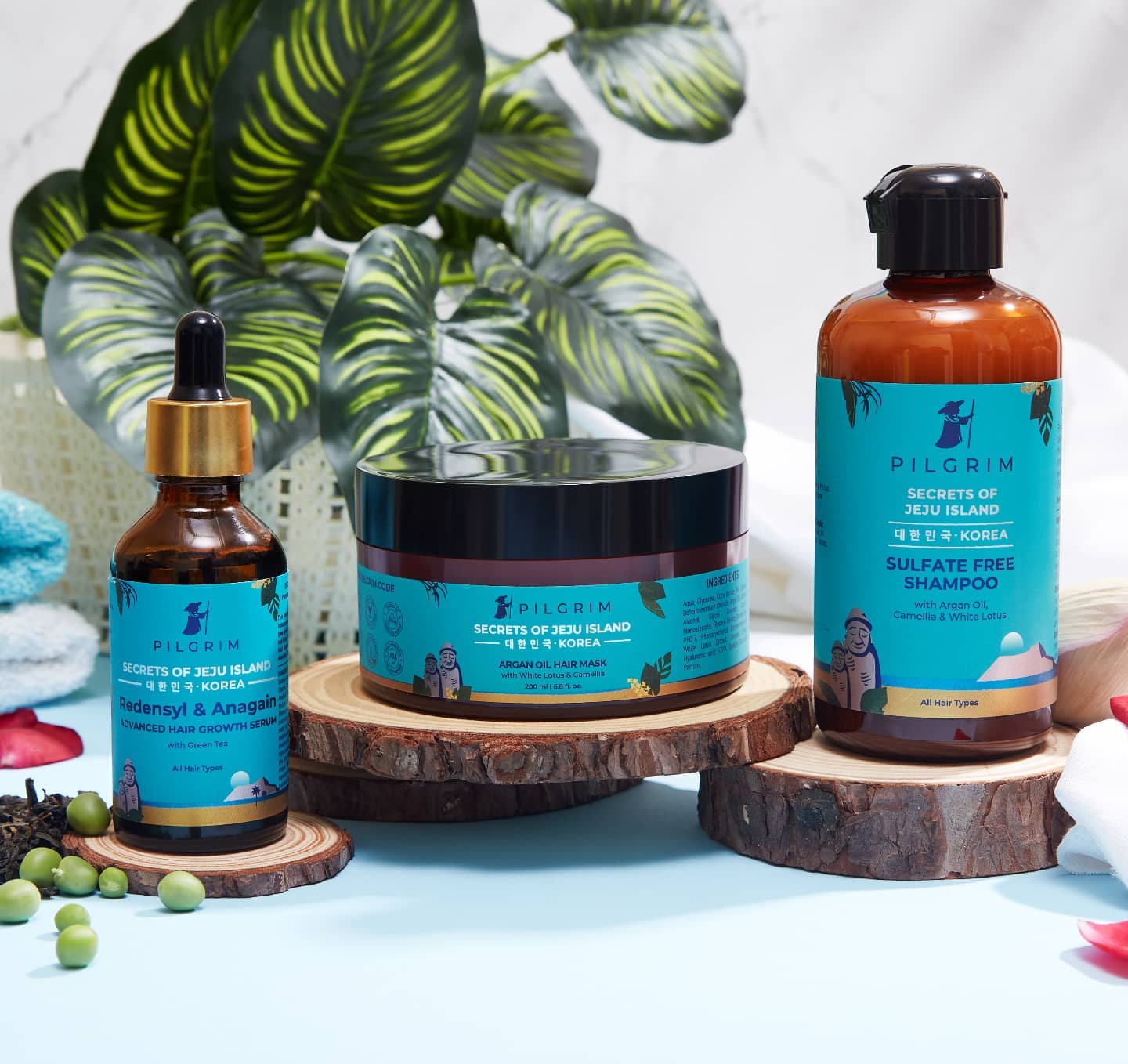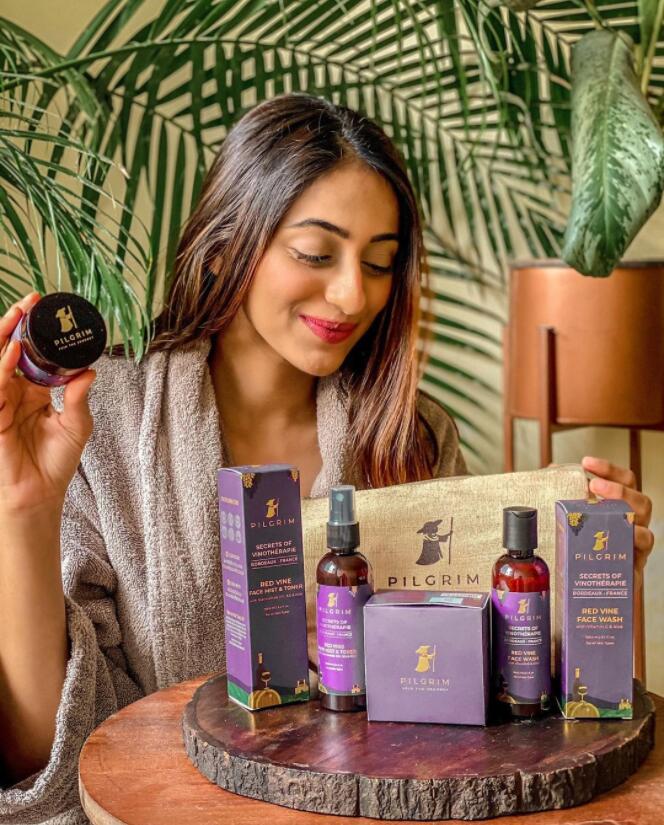Growing up in Bilaspur, Chattisgarh, Anurag Kedia often heard his elder sister and mother discuss natural remedies to nourish the body, skin and hair. He didn’t realise it then, but this experience would lead him to establish Pilgrim, a beauty and skin care brand offering FDA-approved, animal cruelty-free vegan products in 2019. Their ingredients are sourced from locations like Jeju Island, South Korea and Bordeaux, France.
(Image above of Anurag Kedia, CEO and Co-Founder, on the right and Gagandeep Makker, Co-Founder)
“As a child, I spent a lot of time with my sister and her friends. A common topic of discussion amongst us was how to take care of our skin and hair. My mother, who has a Master’s degree in Sanskrit, was also very inclined towards natural remedies. In Bilaspur, meanwhile, multiple newspapers published in Hindi would have a section dedicated to beauty remedies for their readers. I would read up on all the natural beauty remedies while also listening in to the constant discussions at home,” recalls Anurag, in a conversation with The Better India.
Over time, he had developed such a keen understanding and appreciation of these skin and hair remedies that his sister’s friends would often ask him for tips. After completing his education from IIT-Bombay and IIM-Ahmedabad, he found himself heading the marketing department of a leading hair care company in India and soon ended up setting up his company that offered holistic solutions for hair and skin problems.
That’s where he interacted closely with people who had severe skin problems and hair fall despite using expensive products. This is when the idea to offer skincare and haircare products that were without toxins came about.
“My exposure to natural beauty remedies started very early in life. However, I soon came to realise that such natural remedies weren’t just an Indian concern, but a global one. Like Ayurveda in India, there are other native beauty traditions in different countries and the ingredients sourced from there often find their way in products beneficial for either skin or hair, and sometimes both. However, these ingredients are native to a certain part of the world. This is when I started exploring what other natural ingredients are available across the world that’s good for our skin and hair but unavailable in India. We are trying to bring these natural ingredients to Indian consumers,” he explains.
Pilgrim started out with launching a range of Korean beauty products such as hair conditioners, face creams and Vitamin C night serum from ingredients like volcanic lava ash (extremely rich in minerals and has antiseptic, antibacterial, and antioxidant properties), white lotus and camellia sourced from Jeju Island, South Korea.

The second range of products they launched is called French Vinotherapy based on red wine sourced from Bordeaux, France, which is high in antioxidants and helps in repair and healing skin cells. To source these ingredients, they work with multiple partners from across the globe. As of now, Pilgrim doesn’t have a range of products based on ingredients native to India, but will look to incorporate them in the future.
Being Vegan and ‘Plastic Positive’
“At Pilgrim, our goal is to meaningfully contribute to the Sustainable Development Goals of the United Nations 2030 Agenda. We believe in ‘clean beauty’ and hence offer a product range that is 100 per cent vegan, free of harmful toxins, and not tested on animals. In our initiative to reduce our net plastic consumption, we have decided to minimise plastic use and contribute to recycling. We aim to take more such initiatives in the future to contribute towards sustainable development,” said Gagandeep Makker, co-founder, Pilgrim, in a recent public statement.
One thing that the Mumbai-based Pilgrim prides itself on helping recycle more plastic than they consume in packaging their products, and thus calls itself a ‘Plastic Positive’ brand.
He says, “We have a tie up with a venture called The Disposal Company, which collects plastic waste from different parts of the country, and recycles based on whatever sales we’ve accomplished in a given month. We first present our volume of sales and products sold for a given product in a month. After this, The Disposal Company calculates how many kilos of plastic went into packaging for all the units sold, which gives us total plastic consumption for the month. The Disposal Company then recycles more than the commensurate amount of plastic (including the same type used for packaging) we use for packaging in their plants.”
“Pilgrim is currently facilitating the recycling of 1,100 Kgs of plastic every month, and this number is increasing with time,” claims Anurag.
Here’s how The Disposal Company describes the process by which they help ventures remain on the right side of ‘sustainability’: “We help you quickly identify the amount of plastic waste used by your organization per year. At Rs 50 per Kg of your footprint, we collect, clean, segregate and recycle as much plastic waste from the ecosystem as you use. We amplify your climate action through ethical socio-economic and environmental practices. Your contribution helps marginalised waste workers and expands recycling capacities.”
Clean Beauty Standards
Another point of emphasis for Pilgrim is ‘Clean Beauty’, which means avoiding the toxic ingredients often used in conventional beauty and skin care products.
Many of these ingredients, for example, are banned in Western markets such as those derived from petroleum products like mineral oil or sulfates that are essentially detergents and help with cleaning but are also bad for the skin. There is also a class of ingredients called phthalates found in shampoo, soaps and lotions which is bad for your skin.
While there are hundreds of such ingredients, Pilgrim has identified 20 most commonly used ingredients, calling them the ‘Toxic 20’, which include parabens, toluene, formaldehyde, mineral oil, lead and other heavy metals and hydroquinone, amongst others. You can check out the list here.
Take the example of sulfates (SLS/ SLES) that are the same chemicals used to wash cars, utensils, clothes and garage floors. It helps create a foamy lather which has very little to do with cleaning. “Sulfate-free (SLS/ SLES free) products often do not lather (or lather much less) and clean gently. Many products claim to be SLS free but they contain SLES. SLS and SLES are from the same family of chemicals and both are harmful. Sulfates have been shown to irritate our skin and eyes, cause organ toxicity, developmental toxicity, neurotoxicity, endocrine disruption, ecotoxicology, biochemical changes, possible mutations, and cancer,” notes the Pilgrim website.
“We believe that whether natural or synthetic, the ingredients should be biocompatible with your skin. Not all natural ingredients are good for skin/hair and not all chemical ingredients are bad. Most of the ingredients we use are natural and have been carefully selected,” claims Anurag.
Finally, the venture also prides itself on not engaging in any sort of animal testing. They have even received certification from PETA (People for the Ethical Treatment of Animals) as an animal cruelty-free brand. Moreover, they claim not to use any animal-origin products.
“Many traditional ingredients like honey, milk, animal fat, beeswax have been used in beauty products, but they’re not good for the animals concerned or ecosystem at large. Maybe these ingredients have health benefits, but we don’t source any ingredients from animals. We have identified altneratives to offer vegan and animal cruelty-free products to our consumers. Once we complete our product development process, we go for approval from the Maharashtra Food and Drug Administration (FDA), and then launch our products through various channel partners like Nykka, Amazon, Flipkart and our own website as well. We currently sell to anywhere between 50,000 to 60,000 consumers a month in India through various channels, and employ a team of 30, of which two-thirds are women,” he claims.

Avoiding ‘Impossible’ Standards of Beauty
Skin care products have often been accused of either promoting fairness, impossible beauty standards and playing on the insecurities perpetuated by society. As a brand, Pilgrim believes it has been “very careful about the kind of communication” they put out.
“Our objective is not to change the way people look. Our products are there to help them take care of their skin and hair. If you look at the images we use for our photoshoots or videos, we don’t use a lot of makeup. We ask our models to stay natural during these shoots. We are against adopting any form of brand communication that scares our consumers into thinking that if they don’t use a Pilgrim product, something bad will happen to them like losing out in a job interview because of dark skin. Our communication is that you (the consumer) are already perfect the way you are, but still need to take care of the health of your skin and hair. We are not in the business of setting impossible standards of beauty. We believe all skin and hair types are just right. Moreover, the customer should have the choice to enhance their skin and hair, only if they want to, not because they have to,” explains Anurag.
(Edited by Yoshita Rao)
No comments:
Post a Comment